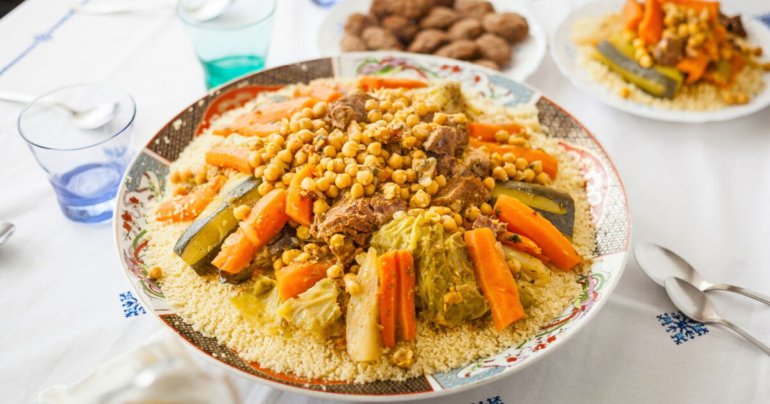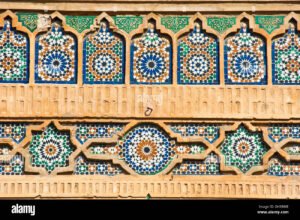Best Moroccan Food: Must-Try Dishes for an Unforgettable Culinary Journey
Morocco is a country where food is deeply woven into the fabric of daily life. Every meal reflects centuries of tradition, influenced by Berber, Arab, Andalusian, and French culinary heritage. From the bustling souks of Marrakech to the serene coastal towns of Essaouira, Moroccan cuisine is an adventure for the senses. The air is filled with the scent of freshly ground spices, slow-cooked meats, and warm bread straight from the oven. For travelers seeking authentic Moroccan food experiences, the variety is endless. Whether indulging in a rich, spice-infused tagine, savoring a delicate, flaky pastilla, or enjoying a refreshing glass of traditional mint tea, each dish tells a story of its origins. This guide explores the best Moroccan food, highlighting must-try dishes that capture the essence of the country’s diverse flavors. Need help? Chat with us on WhatsApp now!1. Tagine – The Heart of Moroccan Cuisine
A staple of Moroccan kitchens, tagine is both the name of a dish and the unique clay pot in which it is cooked. This slow-cooked stew allows ingredients to develop deep, rich flavors, thanks to the gentle heat and the aromatic blend of spices such as saffron, cumin, ginger, and cinnamon. Some of the most popular variations include:- Lamb Tagine with Prunes and Almonds – A sweet and savory combination that balances the tenderness of lamb with the richness of dried prunes.
- Chicken Tagine with Preserved Lemons and Olives – A dish bursting with citrusy and briny flavors, often served with warm Moroccan bread (khobz) to soak up the sauce.
- Vegetable Tagine – A vibrant, spiced mix of seasonal vegetables, slow-cooked to perfection.
Where to Try It:
For an authentic experience, visit Dar Moha in Marrakech or Restaurant Sekaya in Fes, where chefs prepare tagines using traditional slow-cooking techniques.2. Couscous – A Friday Tradition and One of the Best Moroccan Food
Couscous is more than just a dish; it is a symbol of Moroccan hospitality and is traditionally served on Fridays. This steamed semolina grain is light and fluffy, often accompanied by a flavorful broth made from vegetables, chickpeas, and tender meat. A key component is tfaya, a sweet caramelized mixture of onions and raisins, sometimes garnished with almonds.Best Places to Try Couscous:
- La Maison Arabe in Marrakech – Offers an elevated take on traditional couscous.
- Dar Naji in Rabat – Serves generous portions with an authentic home-cooked feel.
3. Pastilla – A Sweet and Savory Pastry Delight
Pastilla, also known as b’stilla, is a unique Moroccan dish that masterfully blends sweet and savory flavors. Traditionally made with pigeon meat, modern variations often use chicken or seafood, wrapped in delicate layers of warqa (a thin Moroccan pastry, similar to phyllo dough). The filling is seasoned with a mix of saffron, cinnamon, and ground almonds, creating a rich, spiced interior that contrasts beautifully with the crisp pastry and its dusting of powdered sugar and cinnamon.Where to Experience It:
For a refined version, visit Le Foundouk in Marrakech, or try a local home-cooked variation in Fes, where pastilla is often served during celebrations.4. Harira – One of the Best Moroccan Food for Comfort
A staple during Ramadan, harira is a hearty, nourishing soup made with tomatoes, lentils, chickpeas, and fresh coriander, often thickened with flour and eggs. It is commonly enjoyed with chebakia, a sesame-coated pastry dipped in honey, creating a perfect balance of flavors.Where to Try It:
- Street vendors in Fes and Marrakech’s Jemaa el-Fnaa square serve some of the most authentic versions.
- Darna in Casablanca offers a homemade, comforting bowl of harira year-round.
5. Mechoui – The Ultimate Moroccan Roast
Mechoui is a dish made for those who appreciate slow-roasted meats. A whole lamb is seasoned with salt, cumin, and spices, then roasted in an underground clay oven until the meat is tender and falls apart effortlessly. Traditionally eaten with hands and fresh bread, mechoui is best enjoyed at local markets where the aroma of roasting lamb fills the air.Best Places to Try Mechoui:
- Mechoui Alley in Marrakech’s Medina is famous for its perfectly roasted lamb.
- Chez Lamine Hadj Mustapha in Marrakech is a must-visit for meat lovers.
6. Rfissa – A Must-Try Dish from the Best Moroccan Food Selection
Rfissa is a rich, deeply spiced dish made with shredded msemen (Moroccan pancakes), chicken, lentils, and fenugreek seeds. The slow-simmered broth is infused with ras el hanout, a complex spice blend that gives this dish its distinctive taste.Where to Try Rfissa:
- Home-cooked versions are the best, but some restaurants in Casablanca and Rabat serve exceptional rfissa.
7. Moroccan Mint Tea – The Symbol of Hospitality
Tea is an essential part of Moroccan culture, and mint tea is the country’s most beloved drink. Made with green tea, fresh mint leaves, and sugar, it is poured from a height to create a frothy top, symbolizing warmth and hospitality.Where to Experience Moroccan Tea Culture:
- Café Hafa in Tangier offers stunning Mediterranean views with a glass of refreshing mint tea.
- Traditional riads in Marrakech and Fes often serve complimentary tea upon arrival.
8. Street Food and Hidden Delicacies from the Best Moroccan Food Scene
For those who love exploring street food, Morocco offers an exciting range of flavors:- Ghoulal (Snail Soup) – A peppery, spiced broth with tender snails, served in small bowls.
- Bissara – A thick fava bean soup topped with olive oil and cumin, a favorite breakfast dish.
- Maakouda – Crispy potato fritters often enjoyed in a sandwich with harissa sauce.
Where to Try Moroccan Street Food:
- Jemaa el-Fnaa in Marrakech – Home to the most famous street food stalls.
- Street vendors in Fes – Known for their bissara and freshly baked breads.
Planning Your Moroccan Culinary Adventure
Best Time to Visit
Morocco’s food scene is vibrant year-round, but visiting during Ramadan provides a unique chance to experience special dishes like harira and chebakia.Essential Dining Etiquette
- Moroccan meals are often served family-style. Sharing is part of the experience.
- Bread is used instead of utensils for scooping up food.
- Expect a warm welcome and plenty of tea before and after meals.









